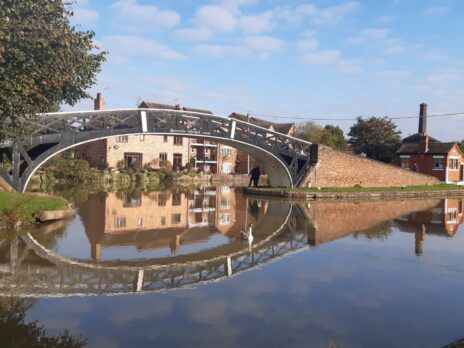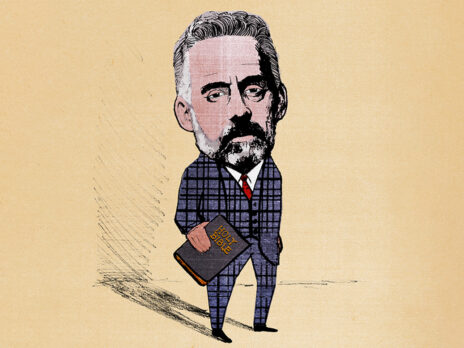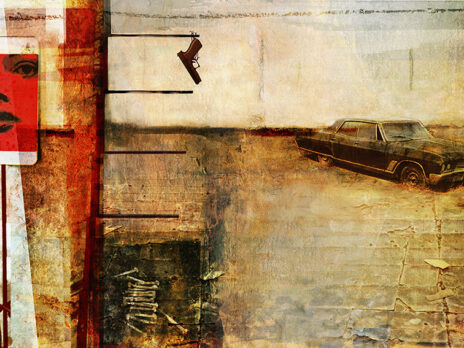Bella Mackie has a thing for appalling, appallingly wealthy people. Her first novel, How to Kill Your Family (not a manual, despite being written during Covid) sold more than a million copies and features a vengeful lovechild, Grace, who discovers her absentee mega-rich father ignored the pleas of her dying mother. So she sets out to kill him and his family, one by one. Mackie’s second novel, What a Way to Go, returns to this formula: country estates, crime scenes, blood diamonds and snide class commentary.
The book centres on the death of Anthony Wistern, a millionaire hedgefund manager nicknamed “Goldicocks” by the tabloid press (a moniker that immediately falls apart on questioning: is it a reference to his general prickish behaviour or his extramarital activities? Is he just really fussy about his… porridge? And, why, God, why, the plural?). This is not a spoiler; the late Anthony partly narrates the story, and the first sentence of the book is: “Looking back on it now, I wouldn’t change much about the night I died.” At his 60th birthday party, he fell – or was pushed – on to a spike holding one of many glowing glass orbs suspended in the lake of the family’s Cotswolds house (they also have one in London and one in France). What a way to go, indeed. It’s delectably ludicrous. Different observers describe him as having been variously “speared”, “lanced”, “harpooned” and “impaled” – the last the best of the synonyms, for giving rise to Anthony’s indignant comment: “How does someone in modern times get impaled?”
Like all good trope-abiding super-rich patriarchs, Anthony has a cold, image-obsessed wife, Olivia. And he has a younger assistant, Lainey, who he’s also been sleeping with (“their relationship was slightly more informal than it should’ve been”) and who is struggling to accept their recent break-up. So that’s at least two motives.
In the style of Jesse Armstrong’s Murdoch-inspired series Succession, Anthony and Olivia have four grasping children, none of whom they seem particularly fond of. Jemima’s only crime seems to be being a typical eldest sibling (I can say this because I am one), ie, a little bossy, at times a bit of a bore, and having married a wet wipe of a man, Will, her very own Tom Wambsgans. Fred, the only boy, is an agricultural sort, obsessed with rewilding the estate – a predilection the rest of his family find baffling. Despite his apparent disdain for the rest of the Wisterns’ lavish lifestyles, Mackie keenly notes, Fred still wears the trappings of his class: a signet ring and a fancy watch stolen from his father’s still-warm body. The youngest two, Clara and Lyra, I had trouble telling apart. Lyra (I think) lives in Paris with her girlfriend, and is too fond of trainers and kohl for her mother’s liking. (“Clothes are a matter of respect and Lyra always dresses as if she’s mocking you.”) Clara, the youngest, is still in school and is glued to her phone. None of them seems particularly sad that their father has died; Clara takes a selfie of herself with in tears and shares it with the caption “RIP Dad”, while the party is still ongoing.
Completing this ungodly cast is Jade, known by her internet handle “The Sleuth”, a keyboard detective who considers herself to be doing a great public service, fighting for “justice” by digging around in the family’s laundry (not quite literally, but it wouldn’t have surprised me if she had) and posting about it on social media. In the world of the Wisterns, Jade is a nobody; a girl who grew up in a decidedly average house ten minutes from Anthony’s Cotswolds manor on “millionaire’s row” and had to abandon her ambitions for a professional life in London to return to the countryside to care for her sick mother. Her perspective is one of the three from which What a Way to Go is told, and could have been an opportunity for a more interesting outside perspective, judging the Wisterns for what they are, or a critique of our true-crime obsessed online age. Instead, she is simply as loathsome of the rest of them. Fun, but hardly illuminating.
Our other narrators are Olivia – from whom we get such gems as: “As I fell asleep, I remembered to practise gratitude. I was immensely grateful that despite the gruesome way my husband died, he’d done it with his clothes on, and not, like Jane Borrall’s husband, naked but for a latex trench coat” – and Anthony, who observes his family from beyond the grave via a live-stream at the “South Gloucestershire processing centre” that it turns out is the first stage of the afterlife. In What a Way to Go, what happens after you die is determined not by God but by an army of indifferent bureaucrats – which seems a lot like hell to a man with limited regard for the law. The staff aren’t too keen on Anthony either: “Even Fred West… had at least been polite.” Before they will allow him to journey on to whatever’s beyond, he must find out how he came to be speared/lanced/harpooned/impaled.
Mackie, the daughter of the former Guardian editor Alan Rusbridger, grew up – and still lives, with her husband, the Radio 1 presenter Greg James – in Kentish Town, north London. How to Kill Your Family took aim not just at the private jet-owning mega-rich, but at the middle-class, north London, Guardian-reading set, too: “I don’t know what it’s like to own a house in Monaco but I do know what it’s like to boast about buying local, like that makes you such a f**king hero,” she told the Irish Times. Mackie was born Rusbridger but took her mother’s surname when she became a journalist to avoid the immediate association with her father. Her first book, Jog On, published in 2018, was a work of non-fiction, about how running helped her deal with lifelong OCD, depression and anxiety.
Part of the appeal of her debut novel, How to Kill Your Family, is that its narrator, Grace, has no filter: she doesn’t self-edit to present herself as polite and palatable; she simply shares every one of her awful thoughts, with no suggestion that she might consider them so. Readers relate to her because we envy her unselfconscious freedom. Our narrators in What a Way to Go do exactly the same, either not caring enough to censor their more egregious thoughts or – more likely – not realising there is anything in them worth censoring. Anthony recalls paying Bear Grylls to take him on a survival expedition in the Yukon: “Two weeks with just my backpack, and I’d thrived. The whole thing cost upwards of 300,000 what with the guides and the doctor we had on standby, but it was worth it to go back to basics and live off my wits”. Funny, yes, but there is nothing human or relatable in any of the sorry bunch. Of course, characters don’t need to be likeable, but it does make it rather hard to care whodunnit. And though Mackie keeps you guessing, her solution, in the end, is particularly unsatisfying.
There is plenty for admirers of Mackie’s black humour and quip-laden prose to enjoy here, particularly at the expense of the mega-rich. Anthony complains about “missing out on the end of a great story my friend was telling about how he’d just bought a cash-strapped school… Those kids are sitting on prime W1 real estate!” and is disturbed that currency does not exist in the afterlife: “Money makes things work, neoliberalism is the greatest thing humans ever did and yet now here I am, part of a society which apparently has no use for it.” Olivia hates that her kids call her by her first name, “not because it implied a distance between us, but because it made me sound like a left-wing parent in North London who thinks her children are her friends,” and says of her son: “That boy is so wet. If he wasn’t so keen on the countryside, I’d think he was a Liberal.” (Mackie makes her own politics clear.)
There are several enjoyable jokes about the “Clarksonification” of the Cotswolds, as Jeanette Winterson put it recently in the New Statesman. “One of the great things about the Cotswolds is you can have neighbours from London. Honestly, it’s rare even to meet a local,” says Olivia. On this, Jade provides a rare counter-perspective: “Now it’s the mega wealthy, the kind who have homes in several places and only descend for a few days at a time before fucking off to the Seychelles or something. It started with a rise in farm shops, and it’s ended with the old tea shop in town now slated as a ‘curated gallery’ where you can buy candles for fifty quid or quilts for eight hundred and nothing in between.”
Mackie’s cultural commentary is equally astute. One of Jade’s former classmates goes on a reality dating show called Shag, Marry or Kill “where people either slept together, got married… or hunted each other with actual crossbows” – and is later “triggered” by the sound of a Catherine wheel as guest of honour at the local fireworks display. The narration is occasionally interrupted by news articles, giving us the “facts” of the case from an outside perspective. The stand-out is a perfect parody of a Tatler interview with Clara, which begins: “Once upon a time, a girl with hair the colour of rich cocoa was born in a birthing pool at her family’s chateau, set in the hills above Nice. The year was 2001…” (Sadly, Tatler is the only publication singled out by name; it would have been great fun had each article quoted been as biting a satire.)
Some witticisms are lacking the necessary wit. Take, for instance: “The man can be as dull as a night at an interpretive dance show.” Others are blunted by repetition. On learning of the death of her husband, Olivia complains that guests, traipsing down to the lake to gawp, are missing the fireworks display due to start on the front lawn: “I always knew Anthony was going to spoil it somehow, he never could take anything seriously.” A few chapters later, we get: “It had been a truly beautiful evening, and I wouldn’t let what happened mar that for me.” And then on the next page: “It’s a pity he died at the lake, because it really was some of my best work.” The party is some of Mackie’s best work, and it is a shame we don’t get to see more such opulence; one of How to Kill Your Family’s great strengths was the creativity of its scene-setting, flitting from Marbella beach club to Mile End sex club, a la Killing Eve.
What a Way to Go is a little heavier-handed than Mackie’s debut, but still deliciously camp, and will be enjoyed by fans of Saltburn and Knives Out – and by champagne socialists who like nothing more than to snipe at the ultra-rich.






